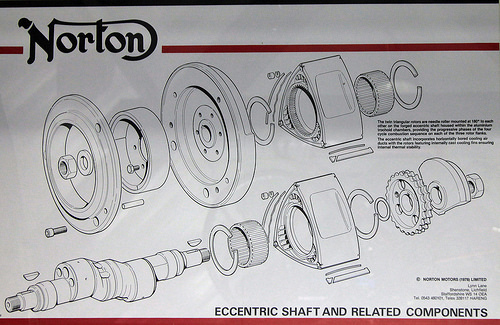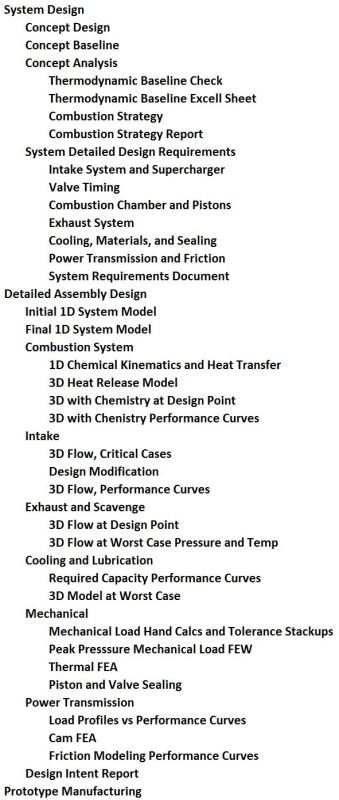RodRico
Automotive
- Apr 25, 2016
- 508
Fellow engineers,
This post promotes my design, but it's also informative for those curious about new developments in engine design, so I hope it's OK. Please accept my apologies if not.
I have submitted my patent pending design for a "Hybrid Miller Cycle Rotary HCCI Engine for RQ-7 Class Drones" in the "Create the Future" contest. You may find it by googling the engine name above or by visiting
Preliminary analysis indicates power density (3 HP per pound) and efficiency (45% with 0.300 BSFC) comparable to a turbofan when operated at full equivalency. When operated in Low Temperature Combustion (LTC) mode, the engine still produces nearly 1 HP per pound but creates very few emissions. Because of its small 10" diameter and 6.5" thickness, multiple engines can be arranged in a clover-leaf pattern around a common shaft to yield 380 HP in a 24" by 6.5" volume. Another set of engines can be arranged behind the first to yield 760 HP in 24" by 16" volume. Note it's not mechanically efficient to add a third engine set due to limitations in my design.
I would greatly appreciate your support of my contest entry. Viewing my entry helps, but voting for it (which requires simple e-mail verification) helps even more. As it stands, I'm only one vote ahead of a "free energy" device ! That's just wrong ! Please circulate the link as widely as possible and encourage all your engineering friends and colleagues to help me win this contest! If I win the contest 100% of the money will go to funding 3D modeling of CFD/Combustion/Heat Loss by a consultant.
Thank you very much for your time and any support you can offer. If you have questions or comments, please post them here or on the contest site and I will answer them to the best of my abilities. I view criticism as being more valuable than praise when it comes to design, so don't hesitate to challenge my design (but please keep it respectful per normal engineering tradition).
Respectfully,
Rod Newstrom
P.S. Some may wonder why I targeted my contest entry at military drones. I would have preferred to emphasize the efficiency and low emissions qualities of my engine when operating in Low Temperature Combustion (LTC) mode. I targeted the military application instead because the administration wants to zero funding at the DOE/ARPA-E (who would normally fund such advances) while simultaneously increasing military budgets. I mention the RQ-7 drone, an unarmed surveillance drone, specifically because my engine fits in the volume and weight envelope of its current engine (the AR-741 Wankel), and the Army issued a Request For Information in 2016 for a replacement engine.
This post promotes my design, but it's also informative for those curious about new developments in engine design, so I hope it's OK. Please accept my apologies if not.
I have submitted my patent pending design for a "Hybrid Miller Cycle Rotary HCCI Engine for RQ-7 Class Drones" in the "Create the Future" contest. You may find it by googling the engine name above or by visiting
Preliminary analysis indicates power density (3 HP per pound) and efficiency (45% with 0.300 BSFC) comparable to a turbofan when operated at full equivalency. When operated in Low Temperature Combustion (LTC) mode, the engine still produces nearly 1 HP per pound but creates very few emissions. Because of its small 10" diameter and 6.5" thickness, multiple engines can be arranged in a clover-leaf pattern around a common shaft to yield 380 HP in a 24" by 6.5" volume. Another set of engines can be arranged behind the first to yield 760 HP in 24" by 16" volume. Note it's not mechanically efficient to add a third engine set due to limitations in my design.
I would greatly appreciate your support of my contest entry. Viewing my entry helps, but voting for it (which requires simple e-mail verification) helps even more. As it stands, I'm only one vote ahead of a "free energy" device ! That's just wrong ! Please circulate the link as widely as possible and encourage all your engineering friends and colleagues to help me win this contest! If I win the contest 100% of the money will go to funding 3D modeling of CFD/Combustion/Heat Loss by a consultant.
Thank you very much for your time and any support you can offer. If you have questions or comments, please post them here or on the contest site and I will answer them to the best of my abilities. I view criticism as being more valuable than praise when it comes to design, so don't hesitate to challenge my design (but please keep it respectful per normal engineering tradition).
Respectfully,
Rod Newstrom
P.S. Some may wonder why I targeted my contest entry at military drones. I would have preferred to emphasize the efficiency and low emissions qualities of my engine when operating in Low Temperature Combustion (LTC) mode. I targeted the military application instead because the administration wants to zero funding at the DOE/ARPA-E (who would normally fund such advances) while simultaneously increasing military budgets. I mention the RQ-7 drone, an unarmed surveillance drone, specifically because my engine fits in the volume and weight envelope of its current engine (the AR-741 Wankel), and the Army issued a Request For Information in 2016 for a replacement engine.



![[bluegreedy] [bluegreedy] [bluegreedy]](/data/assets/smilies/bluegreedy.gif)